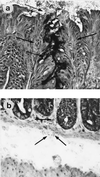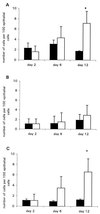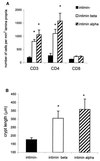Citrobacter rodentium infection in mice elicits a mucosal Th1 cytokine response and lesions similar to those in murine inflammatory bowel disease
- PMID: 10338516
- PMCID: PMC96617
- DOI: 10.1128/IAI.67.6.3031-3039.1999
Citrobacter rodentium infection in mice elicits a mucosal Th1 cytokine response and lesions similar to those in murine inflammatory bowel disease
Abstract
Citrobacter rodentium is a classically noninvasive pathogen of mice that is similar to enteropathogenic Escherichia coli (EPEC) in man. Following oral infection of young mice, the organism colonizes the distal colon, and within 1 week the colonic mucosa doubles in thickness and there is massive epithelial cell hyperplasia. Since T-cell responses in mouse models of inflammatory bowel disease (IBD) also cause epithelial hyperplasia, we have investigated the possibility that C. rodentium promotes similar T-cell responses in the mucosa, thereby increasing epithelial shedding, transmission, and replication of the organism. Beginning 6 days after infection, bacteria were observed to be in close association with the epithelial surface and were also visible scattered throughout the lamina propria and in the submucosa. There was a CD3(+)-cell infiltrate into the colonic lamina propria and epithelium as well as mucosal thickening and crypt hyperplasia. The majority of CD3(+) cells were CD4(+) and were not gammadelta+. Reverse transcription-PCR analysis of cytokines also revealed a highly polarized Th1 response (interleukin-12, gamma interferon, and tumor necrosis factor alpha) in the mucosa and a large increase in the epithelial cell mitogen keratinocyte growth factor. None of the changes were seen in mice inoculated with bacteria lacking intimin (which is necessary for colonization), but they were seen in mice inoculated with C. rodentium complemented with intimin from EPEC. This is the first example of a classically noninvasive bacterial pathogen which elicits a strong mucosal Th1 response and which produces pathology similar to that seen in mouse models of IBD, which is also characterized by a strong Th1 response. These results also suggest that the colonic mucosa responds in a stereotypic way to Th1 responses.
Figures







Similar articles
-
Role of bacterial intimin in colonic hyperplasia and inflammation.Science. 1999 Jul 23;285(5427):588-91. doi: 10.1126/science.285.5427.588. Science. 1999. PMID: 10417389
-
Intimin from enteropathogenic Escherichia coli restores murine virulence to a Citrobacter rodentium eaeA mutant: induction of an immunoglobulin A response to intimin and EspB.Infect Immun. 1996 Dec;64(12):5315-25. doi: 10.1128/iai.64.12.5315-5325.1996. Infect Immun. 1996. PMID: 8945583 Free PMC article.
-
Intestinal pathogen or IBD, same T-cell response.Inflamm Bowel Dis. 2000 Feb;6(1):63-4. doi: 10.1097/00054725-200002000-00014. Inflamm Bowel Dis. 2000. PMID: 10701154 No abstract available.
-
Host defences to Citrobacter rodentium.Int J Med Microbiol. 2003 Apr;293(1):87-93. doi: 10.1078/1438-4221-00247. Int J Med Microbiol. 2003. PMID: 12755369 Review.
-
Citrobacter rodentium of mice and man.Cell Microbiol. 2005 Dec;7(12):1697-706. doi: 10.1111/j.1462-5822.2005.00625.x. Cell Microbiol. 2005. PMID: 16309456 Review.
Cited by
-
Mice Deficient in Epithelial or Myeloid Cell Iκκβ Have Distinct Colonic Microbiomes and Increased Resistance to Citrobacter rodentium Infection.Front Immunol. 2019 Sep 10;10:2062. doi: 10.3389/fimmu.2019.02062. eCollection 2019. Front Immunol. 2019. PMID: 31552024 Free PMC article.
-
Conditioned medium from enterohemorrhagic Escherichia coli-infected T84 cells inhibits signal transducer and activator of transcription 1 activation by gamma interferon.Infect Immun. 2006 Mar;74(3):1809-18. doi: 10.1128/IAI.74.3.1809-1818.2006. Infect Immun. 2006. PMID: 16495555 Free PMC article.
-
Enteropathogenic Escherichia coli infection induces expression of the early growth response factor by activating mitogen-activated protein kinase cascades in epithelial cells.Infect Immun. 2001 Oct;69(10):6217-24. doi: 10.1128/IAI.69.10.6217-6224.2001. Infect Immun. 2001. PMID: 11553563 Free PMC article.
-
Gamma interferon produced by antigen-specific CD4+ T cells regulates the mucosal immune responses to Citrobacter rodentium infection.Infect Immun. 2010 Jun;78(6):2653-66. doi: 10.1128/IAI.01343-09. Epub 2010 Mar 29. Infect Immun. 2010. PMID: 20351140 Free PMC article.
-
Dietary Interventions Ameliorate Infectious Colitis by Restoring the Microbiome and Promoting Stem Cell Proliferation in Mice.Int J Mol Sci. 2021 Dec 29;23(1):339. doi: 10.3390/ijms23010339. Int J Mol Sci. 2021. PMID: 35008767 Free PMC article.
References
-
- Ambrose N S, Johnson M, Burdon D W, Keighley M R B. Incidence of pathogenic bacteria from mesenteric lymph nodes and ileal serosa during Crohn’s disease surgery. Br J Surg. 1984;71:623–625. - PubMed
-
- Bajaj-Elliott M, Breese E, Poulsom R, Fairclough P D, MacDonald T T. Keratinocyte growth factor in inflammatory bowel disease: increased mRNA transcripts in ulcerative colitis compared with Crohn’s disease in biopsies and isolated mucosal myofibroblasts. Am J Pathol. 1997;151:1469–1476. - PMC - PubMed
-
- Barthold S W, Coleman G L, Bhatt P N, Osbaldiston G W, Jonas A M. The etiology of transmissable murine colonic hyperplasia. Lab Anim Sci. 1976;26:889–894. - PubMed
Publication types
MeSH terms
Substances
Grants and funding
LinkOut - more resources
Full Text Sources
Other Literature Sources
Molecular Biology Databases
Research Materials

